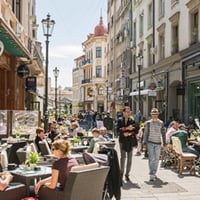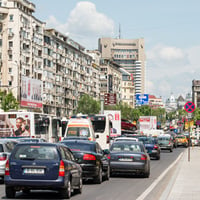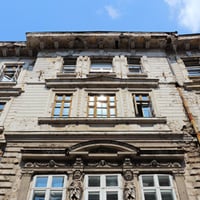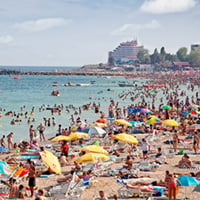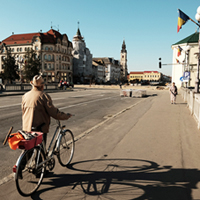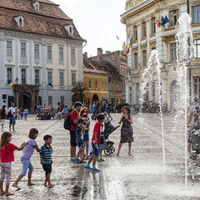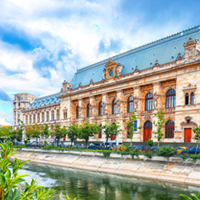Romania
Coastal BeachesRomania is a country located at the crossroads of Central, Eastern, and Southeastern Europe, bordering the Black Sea to the southeast. It shares land borders with Bulgaria to the south, Ukraine to the north, Hungary to the west, Serbia to the southwest, and Moldova to the east. With a rich cultural history and a diverse geography that includes the Carpathian Mountains, rolling hills, and a sizable coastline along the Black Sea, Romania offers a variety of landscapes and experiences. Its capital and largest city, Bucharest, is known for its wide, tree-lined boulevards and the imposing Palace of the Parliament, which is one of the largest administrative buildings in the world. Romania is also home to several medieval towns, fortified churches, and the famous Transylvania region, which is often associated with the Dracula legend. The country's natural attractions include the Danube Delta, a UNESCO World Heritage site and one of Europe's largest and best-preserved deltas, which hosts a vast array of wildlife. Romania's culture is a blend of different influences, with traditions that have been preserved through time, including folk arts, festivals, and cuisine. The official language is Romanian, and the country is a member of the European Union and NATO. Romania has a mixed economy that has been on a trajectory of growth, with sectors like IT and automotive industry playing significant roles. Despite modern advancements, some rural areas still maintain a traditional lifestyle, particularly in regions such as Maramureș and Bukovina. Romania's history is marked by its position between empires and its struggle for independence, which is reflected in its many castles, palaces, and ruins.
 PassportCard Expat Health Insurance
PassportCard Expat Health InsuranceGet Quote
Never worry about paying your medical bills out of pocket again. The innovative PassportCard allows for a stress-free experience for all expat families, remote travelers, and workers. With a 24/7 customer service and an outstanding customer base of over 2 Million clients, it will feel like medical care at home. Get up to 10% off on your policy now.
 PassportCard Expat Health Insurance
PassportCard Expat Health InsuranceNever worry about paying your medical bills out of pocket again. The innovative PassportCard allows for a stress-free experience for all expat families, remote travelers, and workers. With a 24/7 customer service and an outstanding customer base of over 2 Million clients, it will feel like medical care at home. Get up to 10% off on your policy now.
Get Quote
Living in Romania
Visa & Residency
Obtaining a residency in Romania involves several steps and the difficulty can vary depending on the type of visa and the applicant's circumstances. The process generally starts with the applicant determining the appropriate visa category. The Employment Visa (D/AM) is for those who have a job offer from a Romanian employer. The Family Reunification Visa (D/VF) is for family members of Romanian citizens or residents. The Business Visa (D/AE) is for entrepreneurs and business owners who want to conduct economic activities in Romania. Applicants must gather the required documents, which typically include a valid passport, application forms, passport-sized photos, proof of accommodation, health insurance, and a criminal record certificate. For the Employment Visa, an employment contract and a work permit are also required. For the Business Visa, proof of the business activity, such as company registration documents, is necessary. Once the documents are collected, the applicant must submit them to the nearest Romanian embassy or consulate. The processing time can vary, but it usually takes around 45 days for the visa to be issued. After arriving in Romania, expats must apply for a residence permit, which involves a separate application process with the Romanian Office. The difficulty of the process can be considered average, as it involves bureaucracy and the need to provide various documents. However, it is generally straightforward if all the requirements are met and the necessary paperwork is in order. It is advisable for expats to start the visa application process well in advance of their intended move date and to consult with the Romanian embassy or immigration experts if they have any questions or concerns.
Healthcare in Romania
Romania's healthcare system is a mix of public and private services. The public healthcare system is funded by the National health insurance House and provides a range of services to citizens and residents, including emergency services, hospitalization, surgeries, and preventive care. However, the quality of public healthcare can vary significantly, with urban areas typically having better facilities and more resources than rural areas. Private healthcare in Romania is known for its higher quality of service and shorter waiting times, but it comes at a higher cost. Expats and digital nomads can access public healthcare by registering with the National Health Insurance House and paying the required contributions, which is mandatory for those who are employed in Romania. For those who are not employed, voluntary contributions can be made to gain access to the public healthcare system.
Cost of Living
The cost of living in Romania is generally considered moderate when compared to other European countries. Expenses such as housing, food, and transportation are reasonably priced, making it an affordable destination for expatriates and tourists alike.
Weather
Romania experiences a temperate-continental climate with four distinct seasons. Summers are warm to hot, with temperatures often exceeding 30°C in July and August, while winters can be cold and snowy, especially in the mountains. Spring and autumn are milder and can be quite pleasant, though they can also be unpredictable with a mix of rain, sun, and sometimes snow in late autumn or early spring.
Educational System in Romania
The educational system in Romania is structured into several stages: preschool, primary, secondary, and higher education. Preschool education is optional and caters to children aged 3 to 6 years. Primary education starts at the age of 6 or 7 and lasts for four years, referred to as grades 1-4. Following primary education, students enter lower secondary education, which consists of grades 5-8 and is compulsory. After completing the 8th grade, students take a national examination called Evaluarea Națională, which determines their eligibility for upper secondary education. Upper secondary education, or high school, spans grades 9-12 or 9-13, depending on the type of program. Students can choose between theoretical programs, vocational education, or technological education. At the end of high school, students take the Baccalaureate exam, which is crucial for university admission. The Romanian educational system is known for its strong emphasis on theoretical knowledge, particularly in subjects like mathematics and sciences. However, the quality of education can vary significantly between urban and rural areas. Schools in Romania typically start in mid-September and end in early June, with the school year divided into two semesters. The language of instruction is primarily Romanian, but there are schools offering programs in minority languages and that teach in English or other foreign languages.
Copyright 1997-2025 Burlingame Interactive, Inc.

